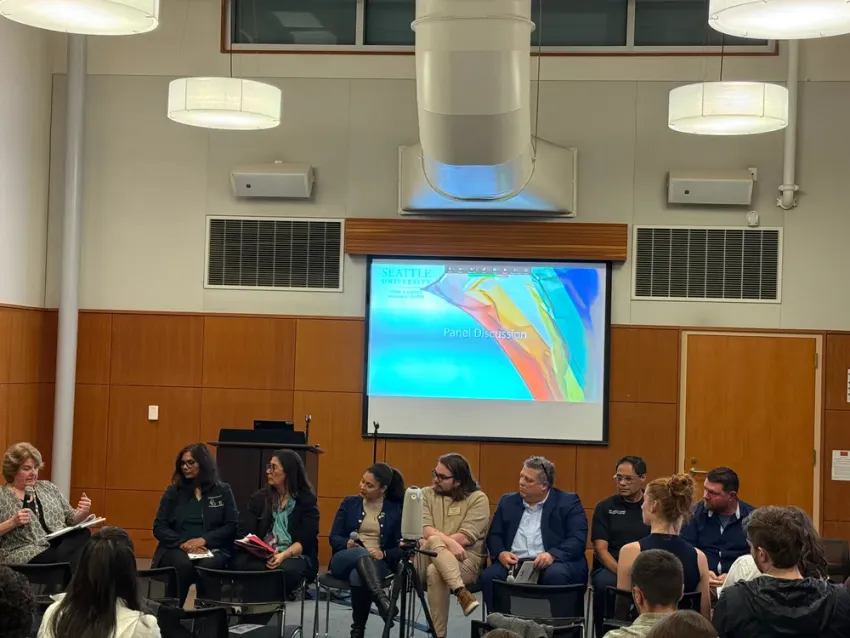On Wednesday November 5, discussions between Queer community members and Seattle Police Department (SPD) officers got heated during a Seattle University (SU) panel about LGBTQIA+-related policing.
The panelists, representing a wide swath of organizations, law enforcement, and government agencies, came together as part of the university’s “Policing the Rainbow” event, which kicked off with a speech by SU Provost Shane P. Martin. Keynote speaker Dr. Valerie Jenness, a professor of criminology, law, and society at University of California, Irvine, shared her story of how the National Institute of Justice under the Biden administration tasked her team with collecting statistical data on how Queer people view law enforcement across the country. During the presentation, she revealed several interesting findings, including how Trans and Nonbinary people, despite self-reportedly trusting law enforcement least, are also statistically more likely to cooperate in police investigations. She both started off and ended her presentation by asking the event’s attendees to ponder the question: “Do you see the police as a friend or foe?”
However the night’s tone went quickly from cordial to contentious as the panel segment, moderated by Dr. Jenness and SU Assistant Professor Li Huang, got underway. The air became tense as both and SU Assistant Professor and Assistant Dean of Student Engagement (and Renton City Councilmember) Carmen Rivera and Seattle LGBTQ Commission Co-Chair Kody Allen confronted the panel’s SPD representatives about previous negative interactions with the police force and called for a major cultural change.
Allen shared two harrowing stories of working at a nonprofit housing shelter. In both instances, he described, almost on the verge of tears, how SPD units arrived late during crises, including being 45 minutes late to a situation where he and three other employees were held at gunpoint. Lt. Douglas Raguso responded by explaining how the SPD’s call-response priorities worked in a manner similar to a hospital triage system. Allen replied, unsatisfied, “I am offended by your answer to what I said.”
Rivera, who said she has family who worked in the SPD, also said that the answer was disingenuous, claiming that SPD response times have historically been used as a tool to punish marginalized communities. She also was critical of the panel and event as a whole for its lack of Queer and Transgender representation and, as a Queer woman herself, explained how research on Queer people as test subjects without community representation in the process made her “feel like an animal in a zoo.”
Others were also featured on the panel, including SPD Sgt. Dorian Korieo, Seattle Office of Accountability Interim Director Bonnie Glenn, Washington State Patrol Office of Culture and Engagement Commander Amandeep Puri, and Washington State Office of Independent Investigations Director Roger Rogoff.
Cmdr. Puri spoke of the recent creation of her department, and the institutional progress they’ve been able to make so far, such as implementing gender-neutral bathrooms, officer trainings, etc.
Dir. Rogoff likewise mentioned the recentness of his position and agency, founded by Gov. Jay Inslee in response to the 2020 BLM protests and death of George Floyd. And Dir. Glenn shared how being a Black woman working within the system gives her a unique perspective on community policing.
Sgt. Korieo told the SGN that since Mayor Harrell’s tenure, SPD as an organization has not been able to make public statements without first getting approval from the mayor’s office. He also expressed frustration at the lack of dialogue between the SPD and the LGBTQ+ community, and said that directives needed to come from the top. He also introduced the SGN to Haden Barton, his replacement as the new SPD LGBTQ+ liaison officer, who was also in attendance.
The SGN had the opportunity to ask Lt. Raguso during the panel about the SPD raid on the Cuff Complex back in January 2024. He replied about needing to enforce the law, regardless of historical precedent and the contradictions inherent in his identity as a Gay man.
But the event’s main contention came to a head when Allen claimed that in the two years since the Seattle LGBTQ+ Commission was founded, out of all the city’s agencies — from IT to Parks and Recreation — the SPD was the only one that hadn’t reached out or responded to attempts for contact. Jacqueline Helfgott, a SU criminology professor, then injected, saying she “hoped it would be a collaborative discussion, instead of attacking.”
Dr. Jenness, an outsider to the local context of Seattle policing and politics, offered as a perspective the story of former Los Angeles police chief Willie Williams, who in 1993 visited the LA Gay and Lesbian Community Service Center, a major shift in police culture toward Queer people. She noted as a moral of the story that it takes people getting out of their comfort zone, on all sides of the table, in order for progress to be made toward collective change.
Support the Seattle Gay News: Celebrate 51 Years with Us!
As the third-oldest LGBTQIA+ newspaper in the United States, the Seattle Gay News (SGN) has been a vital independent source of news and entertainment for Seattle and the Pacific Northwest since 1974.
As we celebrate our 51st year, we need your support to continue our mission.
A monthly contribution will ensure that SGN remains a beacon of truth and a virtual gathering place for community dialogue.
Help us keep printing and providing a platform for LGBTQIA+ voices.
How you can donate!
Using this link: givebutter.com/6lZnDB
Text “SGN” to 53-555
Or Scan the QR code below!



